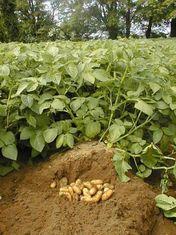
A scientist from the University of Wisconsin-Madison in the US has developed a test to help growers identify good storage quality potatoes while still in the field.
Zahi Atallah developed the test, which involves collecting healthy-looking tubers from the field before harvest, cleaning and juicing them, and then extracting their genetic material.
Using a technique known as polymerase chain reaction, or PCR, a technician can look at the DNA contained in each sample and detect foreign microbial agents that cause storage losses, including late blight, pink rot and fusarium. The results will tell growers, on a field-by-field basis, which potatoes have high levels of these microbes.
"So, instead of storing the good with the bad, now growers can do triage," said Atallah. The potatoes that have a high risk of spoiling in storage can be sent for processing immediately or stored for a shorter amount of time. The ones that look good can be put into long-term store.
The project has been funded by the Wisconsin Potato and Vegetable Growers Association and the US department of agriculture. The technology also has an investor: Pest Pros, Inc which has helped bring the test up to speed commercially and get it onto the market. Pest Pros will begin promoting the potato pathogen assay next year, as one of a number of PCR-based diagnostic tests the company hopes to offer.



